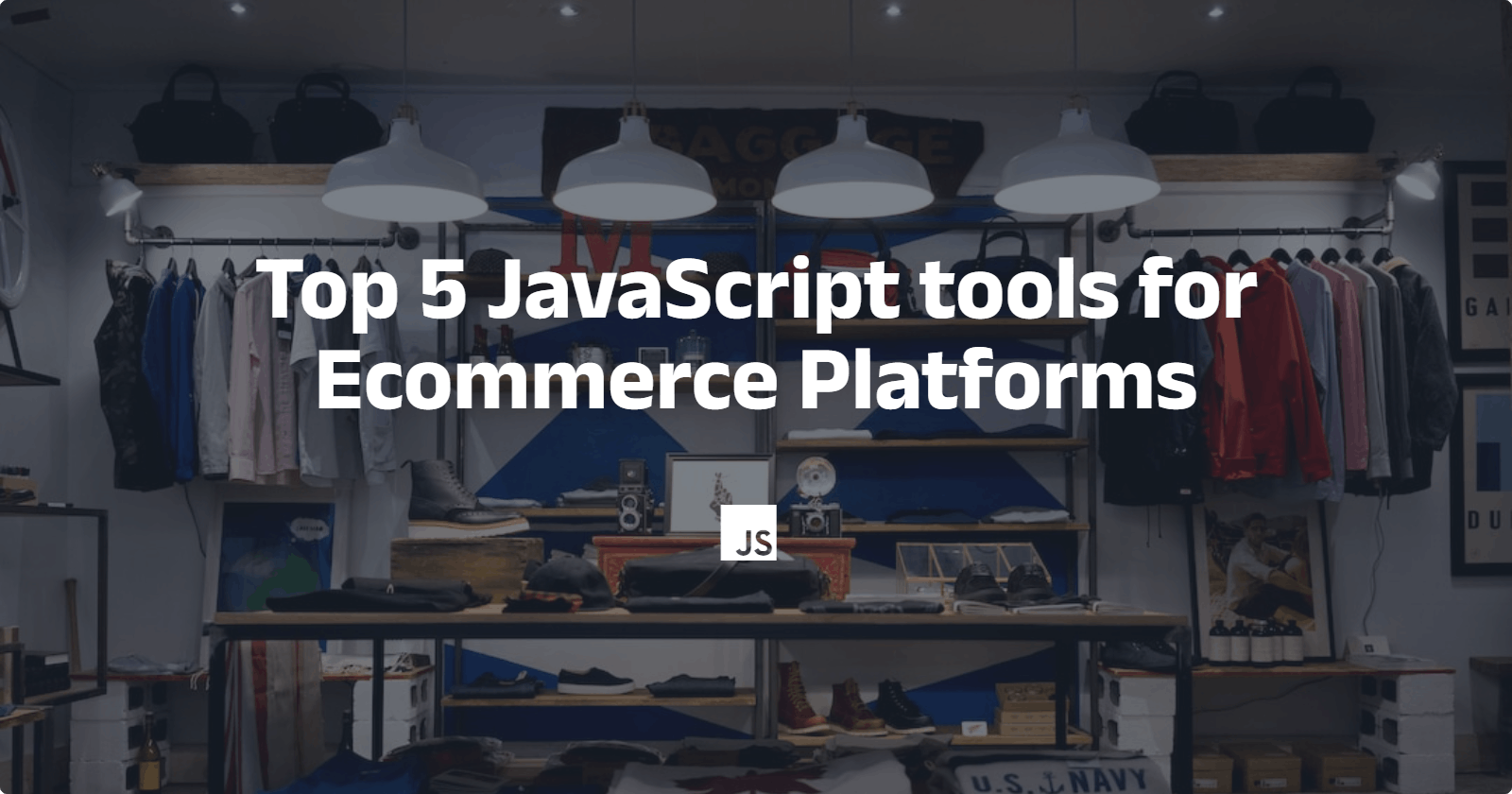Ecommerce platforms are online systems that allow businesses to sell products and services to customers over the internet. Ecommerce platforms have grown in popularity in recent years as more and more people shop online. By 2023, online retail sales will reach $6.51 trillion, adding 22% to all retail sales, according to research by eMarketer and Statista.
JavaScript (JS) is a programming language widely used in developing ecommerce platforms. It allows developers to create interactive and dynamic websites. In addition to client-side development, JS can also be applied to the server side using technologies such as Node.js, enabling developers to use the same language both on the frontend and backend of web applications.
This article will walk you through the perks of using JavaScript in ecommerce and highlight five (5) top JavaScript tools for ecommerce.
Advantages of Using JavaScript in Ecommerce
- Improved User Interaction: User experience is crucial for any online store, as it often influences user retention. JavaScript enables you to create responsive forms, which adjust to various screen sizes and resolutions. This keeps users on board as they fill out forms during purchases, improving their experience.
- Enhanced Performance: The loading time of a website affects its user experience and search engine optimization (SEO). According to research, 47% of users expect a website to load in no more than two seconds. JavaScript allows you to load content simultaneously, which can help improve the performance of ecommerce sites and reduce page load time.
- User Personalization: JavaScript allows you to personalize content and products based on a user's search history, browsing history, and other factors. This can improve the product's relevance to the user and increase the likelihood of conversion.
- Cross-platform support: With JavaScript, businesses can create ecommerce websites that will work on any major web browser, allowing you to reach a broad audience. It can also be used to develop the backend for ecommerce platforms, web storefronts, and mobile applications. This versatility makes it a popular choice among developers, allowing them to use the same language across different platforms and enhancing the overall development experience.
Below is a list of five tools that can be highly beneficial for different aspects of an ecommerce platform.
1. Node.js Ecommerce Backend: Medusa
Medusa is an open source composable commerce platform built on Node.js with which developers can build custom ecommerce applications. Medusa is an ecommerce platform that provides a robust set of features for managing orders, exchanges, returns, customers, customer groups, products, collections, regions, prices, taxes, sales channels and more.
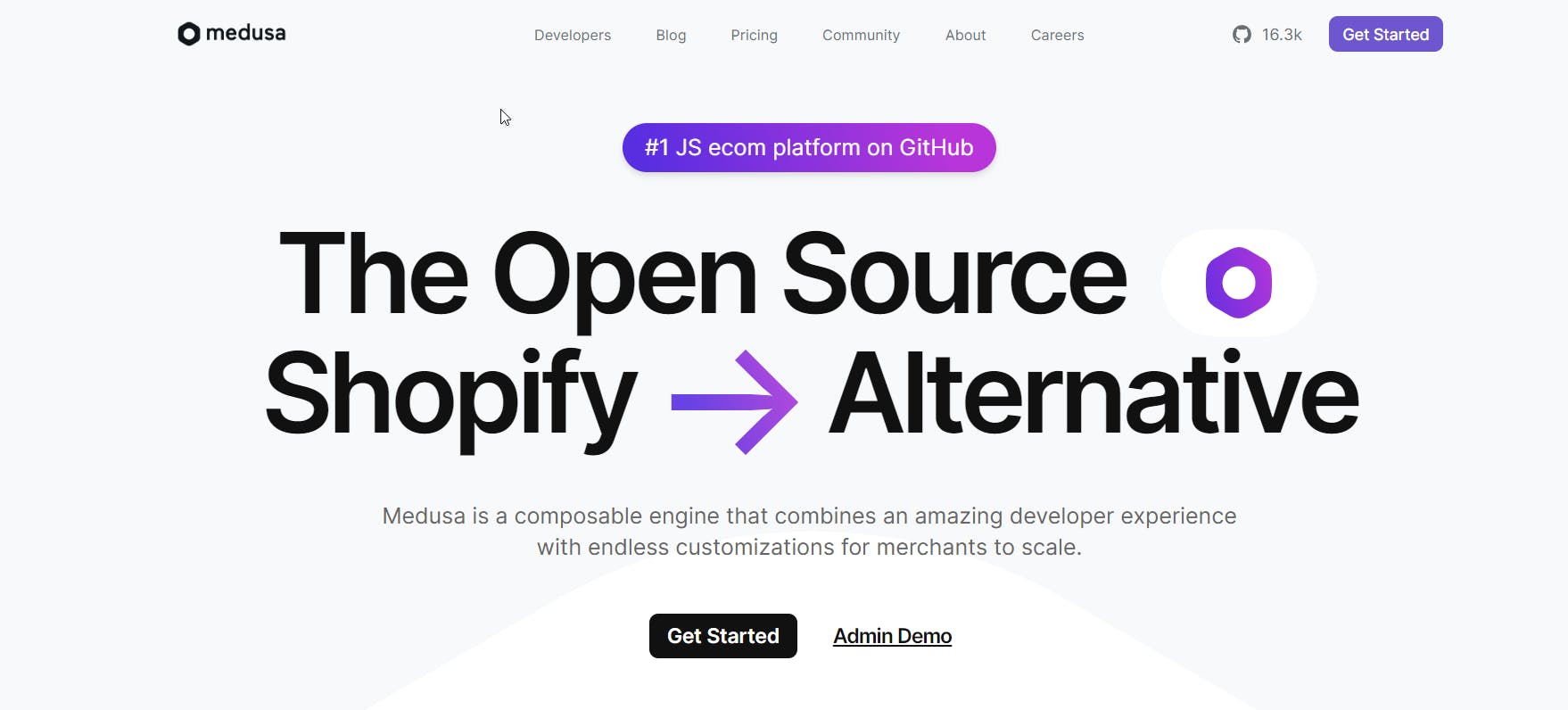
With Medusa, businesses can easily configure and manage multiple regions and currencies, integrate with various fulfillment providers, payment providers, and other third-party services using its plugin system, and use advanced pricing strategies with conditions based on the amount in the cart or promotions and discounts.
Medusa also offers powerful import and export tools for bulk importing and exporting different entities such as products and orders, making it a versatile and flexible solution for businesses of all sizes.
Medusa uses a decoupled architecture, meaning the backend is separated from the frontend. Developers can build the storefront with any frontend framework, such as Next.js, or a static site generator like Gatsby. Here's more information about Medusa architecture.
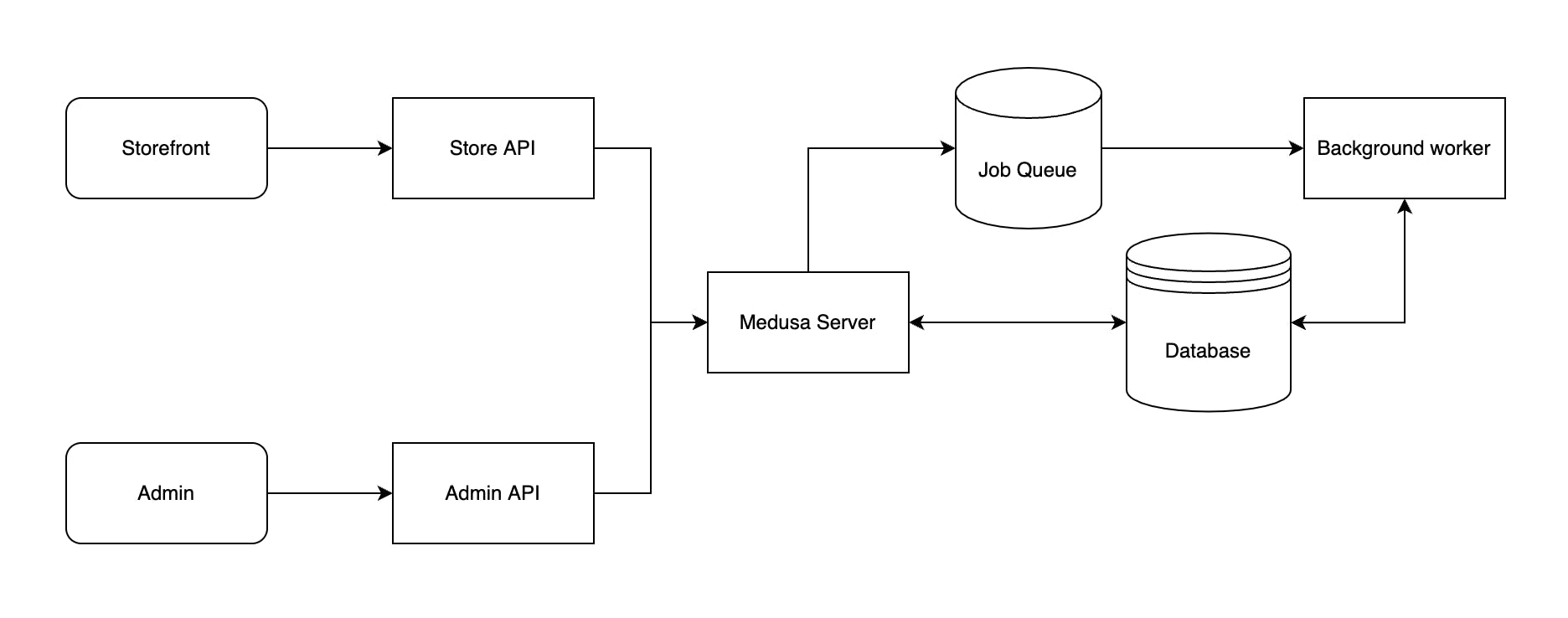
Medusa is divided into three parts:
- Medusa Server: This is the backbone of Medusa. It comes with ecommerce functionalities such as user management, cart, payment, and many more.
- Admin Dashboard: An admin panel that allows merchants to manage their stores. This also offers functionalities such as discounts and order management across regions.
- Storefront: This is the frontend of the ecommerce store, which comes with features such as product listing, checkout, and customer login. Medusa offers two prebuilt storefronts: Next and Gatsby.
Benefits of Using Medusa for Ecommerce
- Flexibility: It can be integrated with third-party payment systems like PayPal and Stripe, content management systems like Contentful and Strapi, and storage services like Amazon S3. A list of Medusa integrations can be found here.
- Customization: Medusa is highly customizable, making it a powerful solution for a wide range of ecommerce platforms. Its plugin system allows developers to easily add or extend new features, allowing for a tailored and unique experience for each platform.
- Community: Medusa is an open source ecommerce solution supported by the community. With over 16k stars on GitHub, Medusa has an active open source community of developers eagerly working to improve the solution.
- Performance: Medusa is based on Node.js, known for its high performance and low latency. You get out-of-the-box performance features, including page speed and SEO, with Medusa.
- Scalability: It is a highly scalable tool, allowing for easy expansion and growth as your ecommerce platform increases in size and complexity. You can easily handle increased traffic and data storage needs without worrying about performance issues or system crashes.
2. Static Site Generator: Gatsby
Gatsby is a static site generator and a modern web framework based on React.js. It is used to build fast, efficient websites, and web applications. Static site generation preloads the entire website at build time, resulting in faster load times and better performance.
In addition to using GraphQL, Gatsby allows developers to easily fetch and manipulate data from different sources, such as headless CMS, APIs, and databases.
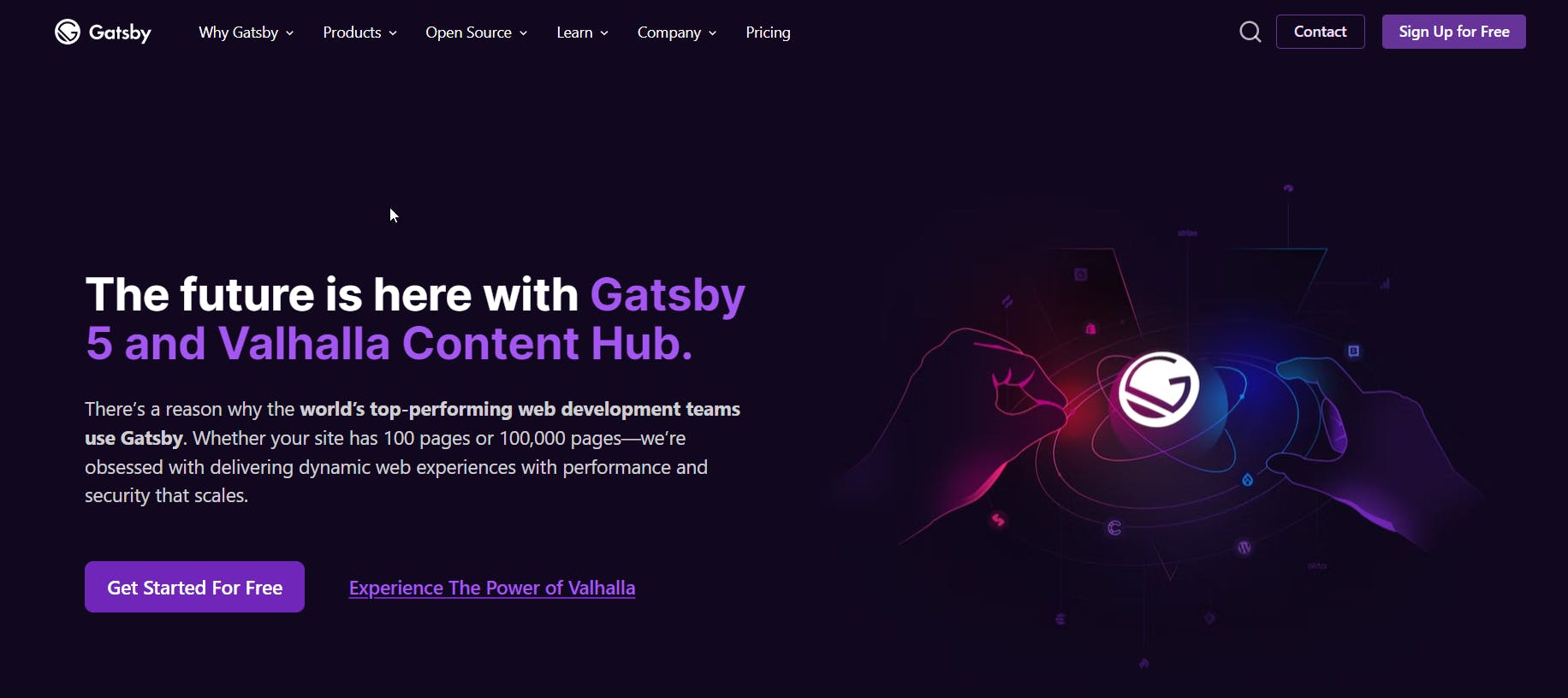
Benefits of Using Gatsby for Ecommerce
- Flexibility: With Gatsby, developers can customize the appearance and feel of ecommerce sites and even add interactive features like user reviews and product filtering.
- Speed and Performance: As stated earlier, an ecommerce site's load time is vital. With Gatsby, websites are pre-rendered, which results in faster load times and improved performance. This is important for ecommerce websites, as customers are more likely to only return to websites that load quickly.
- It is SEO Friendly: SEO helps ecommerce websites increase brand visibility, which leads to more customer visits and revenue increase. Gatsby websites are pre-rendered, which makes them easily crawlable by search engines. It helps ecommerce businesses to be be easily found by customers through search.
- PWA support: Progressive Web Applications (PWAs) are web apps that can be installed on the user's device and work offline. By default, Gatsby websites are PWAs, which means that ecommerce websites can provide consumers with a more app-like experience.
3. Automated Testing: Nightwatch.js
Nightwatch.js is a Node.js-based automated testing framework used to test web applications. It allows developers to create automated tests that simulate user interactions, such as filling out forms and submitting data.
With Nightwatch.js, developers can write tests that can be used to test the functionality of web applications and their performance and usability across different browsers. This allows developers to focus on writing code while ensuring that their application works as expected.
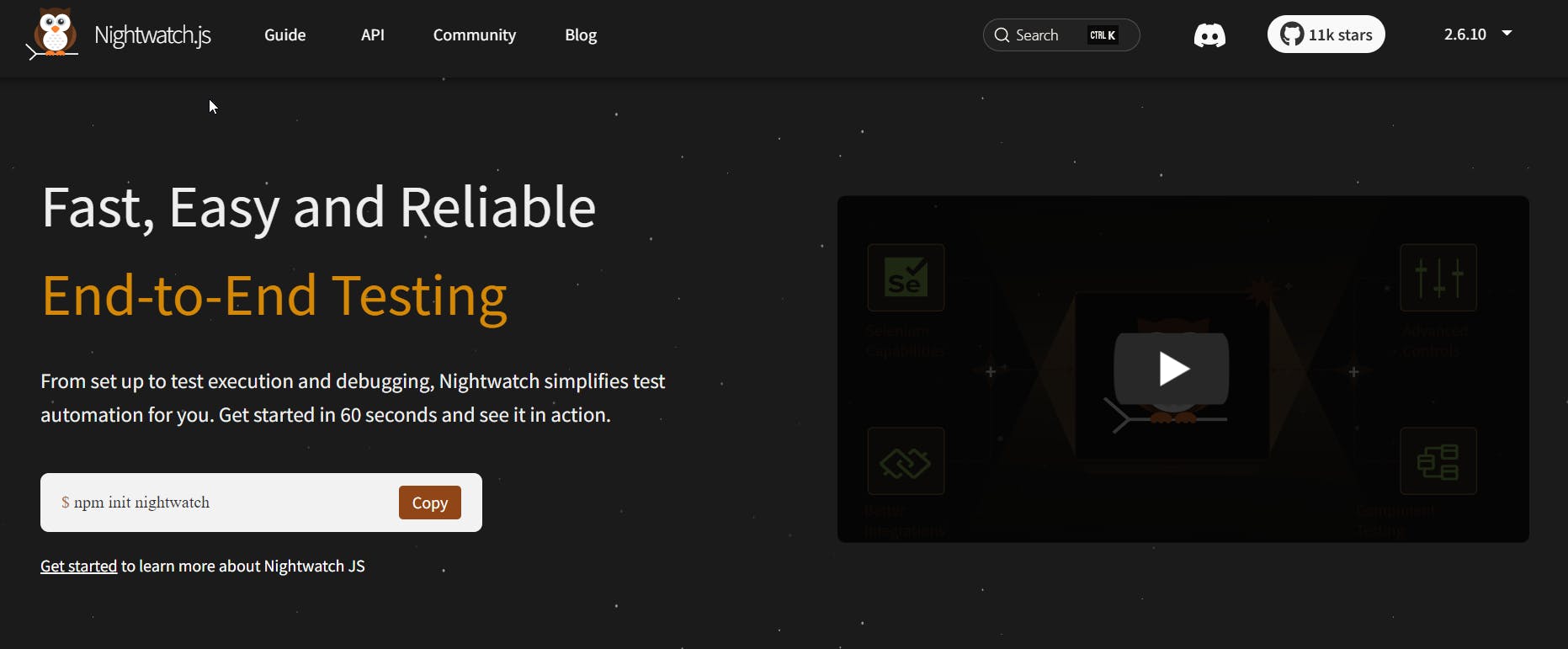
Benefits of Using Nightwatch for Ecommerce
- End-to-End Testing: Nightwatch.js makes it possible to test every aspect of an ecommerce website, from when a user clicks on a link to when they complete their purchase.
- CI/CD Integration: Nightwatch.js is an open source project that can be integrated with continuous integration and continuous delivery tools such as Jenkins, Travis CI, and CircleCI. Applications can be automatically tested when code changes are pushed and deployed when all tests pass.
- Cross-Browser Support: Nightwatch.js allows developers to test their ecommerce websites on multiple browsers, including Chrome, Firefox and Safari. This allows them to ensure that their site works as expected across all platforms.
- Growth Potential: As an ecommerce website traffic grows, it is essential to maintain a satisfying user experience. As an ecommerce website grows, Nightwatch.js can be used to scale up testing and create a wide range of tests.
4. JavaScript Monitoring: LogRocket
Logrocket is a Javascript monitoring tool for monitoring performance metrics in real-time and tracking user experience in web applications. Per LogRocket's website, "LogRocket combines session replay, error tracking, and product analytics – empowering software teams to create the ideal web and mobile product experience."
LogRocket works by instrumenting a web application's JavaScript code and collecting data about user interactions, browser events, and network requests. After the data is collected, the LogRocket dashboard allows developers to view and analyze it in various ways.
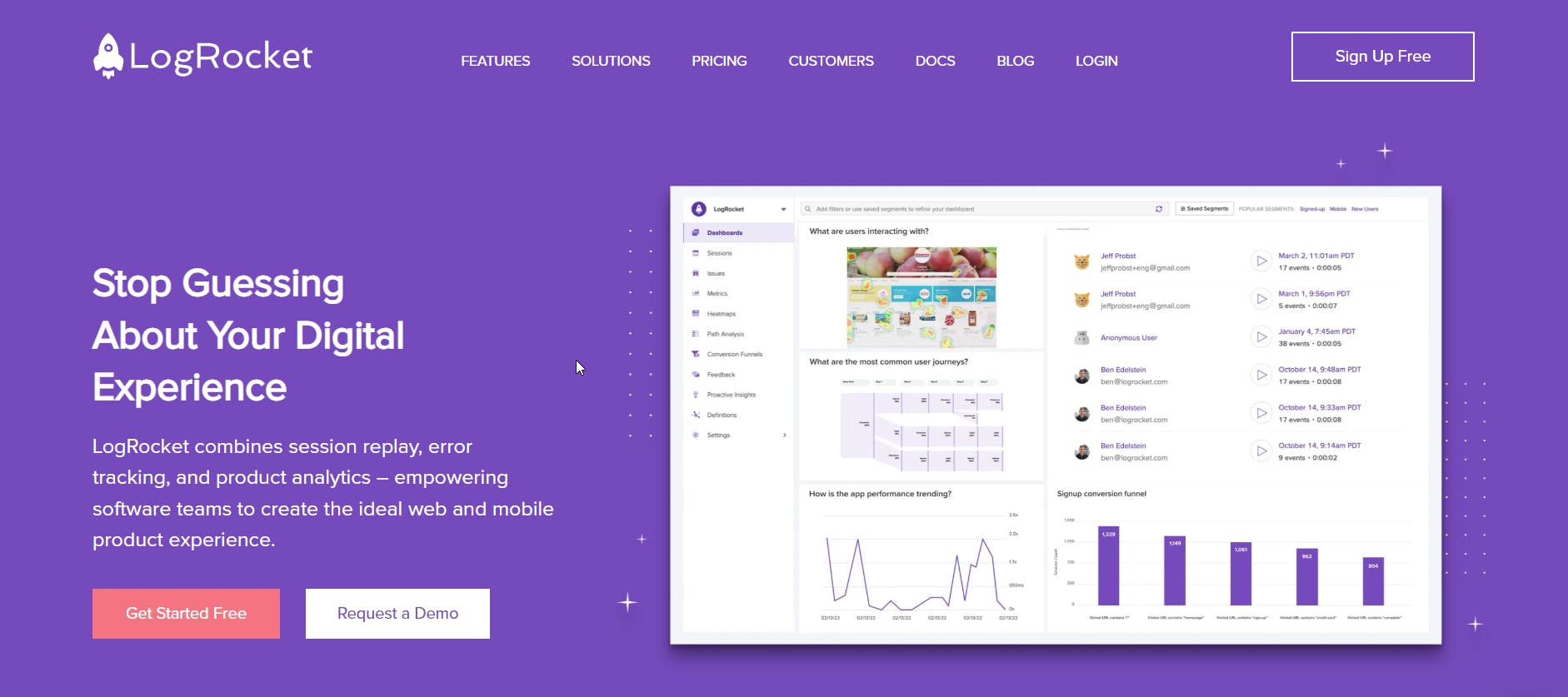
Benefits of Using LogRocket for Ecommerce
- Real-Time Monitoring: Identifying and resolving issues as they occur helps improve the user experience of an ecommerce website. LogRocket alerts you whenever an issue occurs. It includes an explanation, links to the impacted page and a list of possible affected users. It also sends notifications via the dashboard, email, and any other integrated tool such as Slack.
- User Analytics: Understanding how users interact with your ecommerce websites is good for business. Logrocket allows you to analyze users' behaviour and get better insight through its session replay feature. Developers can watch a recording of user sessions, such as clicks, scrolls, and form submissions, which can be highly useful for resolving usability and bug-related issues.
5. Live Chat: Zendesk Chat
Zendesk Chat is a live chat software that allows businesses to provide real-time customer support to their website visitors. This enables businesses to communicate with their customers in real time through a chat widget on their website. This way, companies can provide quick and convenient support, address customer questions and concerns, and help to increase customer satisfaction and conversion rates. In addition, it allows businesses to provide timely and practical assistance to their customers in a personalized and conversational manner.
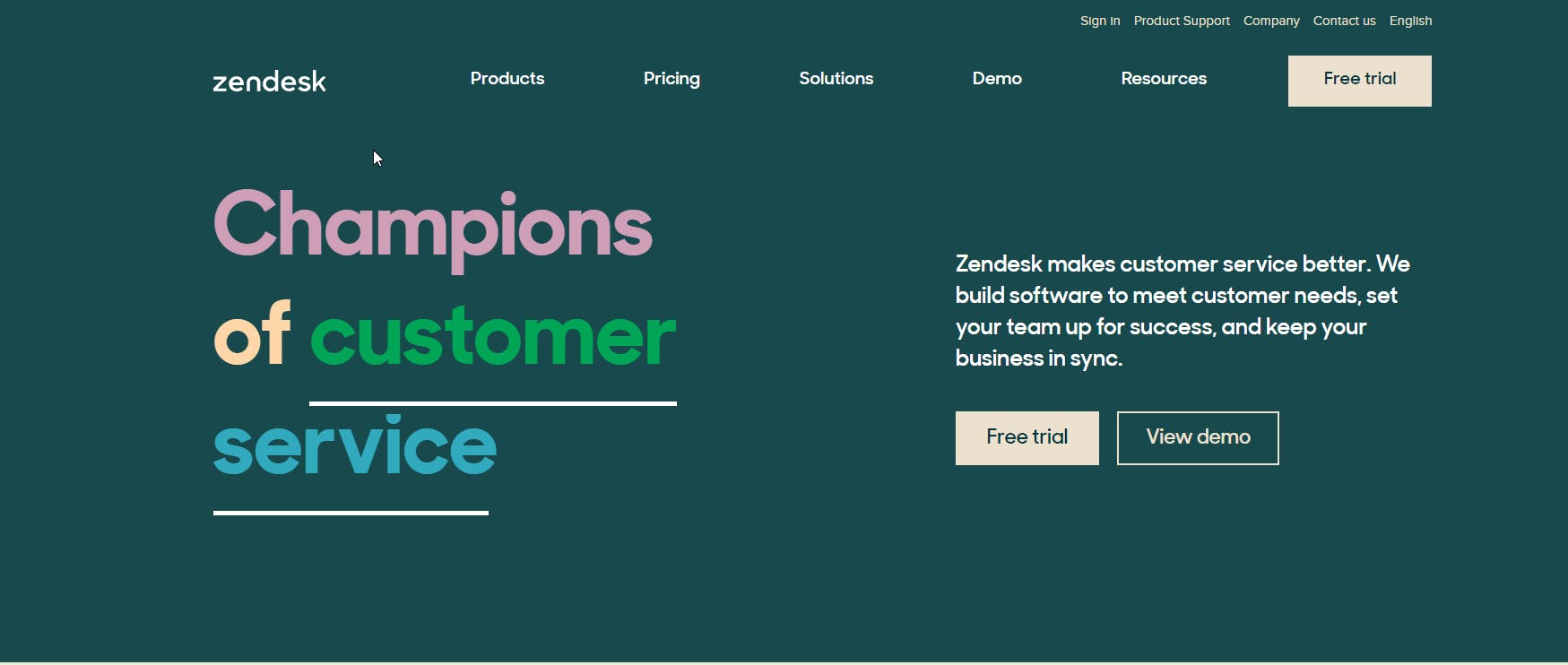
Benefits of Using Zendesk Chat for Ecommerce
- Improved Customer Engagement: Zendesk Chat allows ecommerce businesses to engage with customers in real time. It builds stronger relationships, which increases customer loyalty.
- Reduced Support Costs: Live chat is a low-cost means of providing real-time customer support to ecommerce businesses. It is a more effective way to resolve issues compared to phone or email support, which could be time-wasting and require multiple steps, delays, and transfers to reach an agent.
- Integration: Zendesk Chat can be integrated with other tools, such as CRM and ecommerce platforms, which allows ecommerce businesses to access customer data and order information in real time, improving the efficiency of the support process.
Conclusion
Using JavaScript tools in any ecommerce project is essential for creating a fast, efficient, and user-friendly website. The top 5 JavaScript tools for ecommerce platforms introduced in this blog post are Medusa, Gatsby.js, Nightwatch.js, LogRocket, and Zendesk Chat. They have unique features and benefits intended to improve ecommerce platform performance, conversions, and user experience.
Medusa is a highly customizable composable ecommerce platform. With Medusa, you can build a scalable JavaScript ecommerce platform with a fast development process.
You are welcome to contact the Medusa team via Discord if you have any issues or questions related to Medusa.

